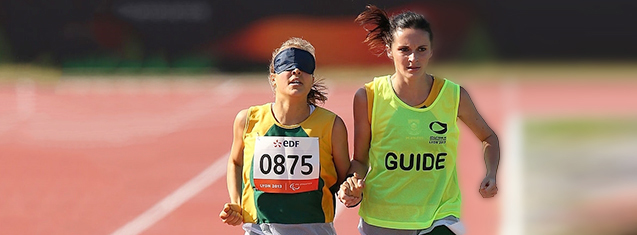
Louzanne making a leap for the finish line with guide runner Rouxné Vermaak
Within the space of seven days, Louzanne Coetzee will take part in both the 1500m and 800m events at the International Paralympic Committee (IPC) Athletics World Championships, being held in Doha, Qatar, from 21-31 October 2015.
The BA Corporate and Marketing Communication Honours student at the University of the Free State (UFS) was selected to represent South Africa (SA) by the South African Sports Confederation and Olympic Committee (SASCOC). Team SA consists of 23 top athletes, who will be competing in different codes against 89 other countries.
The middle- and long-distance T11/F11 class athlete has won countless medals since her debut in professional athletics in 2012. After only five months, she reached the qualifying standard for international participation, with an impressive 2 minutes 53.8 seconds in the 800m at the 2013 Nedbank National Championships for the Physically Disabled, held in Pretoria.
Louzanne has since achieved another international milestone by making the SA team, following her inaugural IPC meeting, hosted by France two years ago.
“It’s a big honour for me to represent South Africa, and I count myself very fortunate to represent the country at the World Champs,” said the former Accessibility and Student Support Student Representative Council (SRC) member.
The IPC World Championships precede the Rio 2016 Paralympic Games, which are known as “the biggest sporting event on the planet”. Qatar is Louzanne’s Rio, and she intends to outdo her personal best in order to qualify. “I want to get my ranking high enough so that I can go to Rio in 2016,” said the gold medallist.